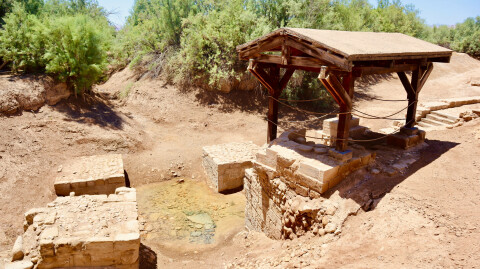TLDR: Our Bible give us a number of stories about people who chose generosity over fear, and that made all the difference in their lives. Please read on for more.
There are many stories of sacrificial giving in Holy Scripture, and I love most of them. I want you to imagine the scene: There is a poor widow in a desert town with a young son to care for during one of the country’s most severe famines. She has gone through all the resources she had and all that is left is a bit of flour at the bottom of a jar. She has enough for one last meal before she and her son are completely out of provisions. There is impending death on the horizon. Then, suddenly, she hears the voice of a man, “Would you bring me a little water in a jar so I may have a drink? And bring me, please, a piece of bread.” I can just imagine her moral dilemma. The rules of hospitality at this time require that she care for her unwanted guest. On the other hand, her child is hungry and desperate. What will she do?
The widow replies, “As surely as the Lord your God lives, I don’t have any bread—only a handful of flour in a jar and a little olive oil in a jug. I am gathering a few sticks to take home and make a meal for myself and my son, that we may eat it—and die.” Her situation could not be any more desperate. But then she was invited by the man to have some courage, to trust in the visitor’s God. “Don’t be afraid. Go home and do as you have said. But first make a small loaf of bread for me from what you have and bring it to me, and then make something for yourself and your son. For this is what the Lord, the God of Israel, says: ‘The jar of flour will not be used up and the jug of oil will not run dry until the day the Lord sends rain on the land.’” (1 Kings 17:7-14). What would you do? Would you sacrifice your own child to provide food for a guest? The woman has a difficult choice to make. The passage tells us that she chose generosity over fear and that made all the difference in her life and the life of the child. This was a sacrificial generosity of unprecedented proportions, which resulted in never-ending flour and abundant olive oil, enough to support their lives for the duration of the famine.
In the Gospel of Luke (21:1-4) we see an incredible story. Jesus looks at people as they put their coins in the Temple’s treasury. The heavy, costly coins of the rich made a spectacular noise as they touched the copper plates. Every time a rich person threw a coin in, maximizing the noise the coin would make, others would look at them impressed by their generosity. But Jesus saw a poor widow who put in two small copper coins. They were so lite that they didn’t even make a sound. Jesus said to his disciples, “Truly I tell you, this poor widow has put in more than all of them; for all of them have contributed out of their abundance, but she out of her poverty has put in all she had to live on.”
Once again, we have a story of sacrificial giving. The widow most likely comes from a poor family and may even be an outcast to her community. When the husband dies without leaving a male heir, even wealthy spouses can see themselves homeless overnight. Women are not allowed to inherit and many of the scribes appointed to manage their income often misspent the money or robbed them, leaving them penniless. This is what Jesus means when he says that some Pharisees, “devour widows’ houses and for the sake of appearance say long prayers.” (Luke 20:47). We don’t know for sure if this widow has gone through this type of situation. All we know is that Jesus believed her to be poor, which makes him comment on her humble offering. She gave out of her need, rather than out of her abundance, and her behavior is described as humble and contrite.
The vision to unite all in the love of God is grounded in gratitude, revealed in prayer, lived out in faith, and it becomes evident by the fruits we produce. One of these fruits is sacrificial giving.
I am often impressed by the generosity of this congregation. As we enter into the public phase of our Capital Campaign, I find myself praying for abundant generosity, based on the Jesus model of giving, which we will study in the upcoming weeks. In short, we give abundantly because we have received abundantly, and we live in an abundant world. Blessed be God’s name. Amen!
Fr. Roman+





